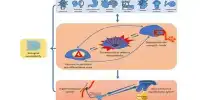Probiotics, according to the researchers, significantly improve the symptoms of pregnancy-related nausea, vomiting, and constipation. Nausea and vomiting affect approximately 85 percent of pregnancies and can have a significant impact on quality of life, especially during the early stages of pregnancy.
Researchers at the UC Davis School of Medicine discovered that probiotics significantly improve the symptoms of pregnancy-related nausea, vomiting, and constipation in a first-of-its-kind study. The research was published in the journal Nutrients. Nausea and vomiting affect approximately 85 percent of pregnancies and can have a significant impact on quality of life, especially during the early stages of pregnancy.
“To this day, the cause of nausea and vomiting during pregnancy is unknown. Several hypotheses have been proposed, but none of them are conclusive “Albert T. Liu, a professor of obstetrics and gynecology and the study’s lead author, said
Over the years, I’ve noticed that probiotics can help with nausea, vomiting, and constipation. During pregnancy, nausea, vomiting, and constipation can all have a negative impact on a patient’s quality of life. When nausea and vomiting during pregnancy worsen, they can be difficult to control, and the patient may need to be hospitalized.
Professor Albert T. Liu
“During pregnancy, nausea, vomiting, and constipation can all have a negative impact on a patient’s quality of life. When nausea and vomiting during pregnancy worsen, they can be difficult to control, and the patient may need to be hospitalized” Liu stated.
Beneficial microbes
Probiotics are also known as “beneficial bacteria.” They can be found in yogurt, kimchi, kefir, sauerkraut, and tempeh, among other foods. Food supplements containing probiotics are also available. Other than vitamins, probiotics or prebiotics were the third most commonly used dietary supplement for adults, according to the National Center for Complementary and Integrative Health. Probiotics are thought to support the community of different microbes found in the gastrointestinal tract, known as the “gut microbiome.”
Hormones such as estrogen and progesterone rise during pregnancy, causing a slew of physical changes. These increases may also alter the gut microbiome, affecting digestive system functions and causing unpleasant symptoms such as nausea, vomiting, and constipation.
The researchers set out to see if taking a probiotic supplement could help with gastrointestinal function during pregnancy. The experiment lasted 16 days. A total of 32 people took a probiotic capsule twice a day for six days and then rested for two days. They then went through the process again.
The probiotics were available without a prescription and primarily contained Lactobacillus, a type of good bacteria. At the time of manufacture, each capsule contained approximately 10 billion live cultures.

During the study, participants kept 17 daily observations of their symptoms, for a total of 535 observations for the researchers to statistically analyze. The researchers discovered that taking the probiotic reduced nausea and vomiting significantly. The number of nausea hours (the number of hours participants felt nauseous) was reduced by 16%, and the number of times they vomited was reduced by 33%. Probiotic consumption also significantly improved quality-of-life symptoms such as fatigue, poor appetite, and difficulty maintaining normal social activities, as measured by questionnaires. Probiotics have also been shown to significantly reduce constipation.
“Over the years, I’ve noticed that probiotics can help with nausea, vomiting, and constipation. It’s very encouraging that the study confirmed this “Liu stated. “Probiotics have also benefited many of my other patients who were not included in the study,” Liu said.
New clues from gut microbes and byproducts
Before and during the study, participants also provided fecal specimens. The samples were analyzed to determine the type and number of microbes present, as well as the various byproducts of digestion. This allowed the researchers to see if biomarkers in the feces were associated with more severe nausea and how the probiotics affected participants who started the study with different baseline biomarkers.
One discovery was that a low amount of bacteria carrying an enzyme called bile salt hydrolase, which generates bile acid to absorb nutrients, was linked to more pregnancy-related vomiting. Probiotics promote the growth of bile salt hydrolase-producing bacteria, which may explain why the supplements reduced nausea and vomiting.
Another finding was that at the start of the study, high levels of the gut microbes Akkermansia and A. muciniphila were associated with more vomiting. The probiotic significantly reduced the amount of those specific microbes as well as vomiting. This suggests that Akkermansia and A. muciniphila may be reliable biomarkers for pregnancy vomiting.
Another finding was that taking probiotics increased vitamin E levels. Higher vitamin E levels were linked to lower vomiting scores.
“This study sheds light on the role of gut microbes in gastrointestinal function during pregnancy. Our gut microbiota explains why we are what we eat and why metabolites and products produced by bacteria have such a large impact on our health “Wan stated. “They have an impact on the gastrointestinal tract, skin health, and neurological function.”
Although the findings are intriguing, the researchers caution that further research will be required to confirm the effects of the probiotics due to the small sample size.
“Previous research has shown that probiotics can help prevent liver inflammation. The current study could be among the first to demonstrate the benefits of probiotics during pregnancy “Wan stated. “It would be interesting and critical to conduct additional research to see if probiotics can reduce nausea and vomiting caused by chemotherapy in cancer patients.”














